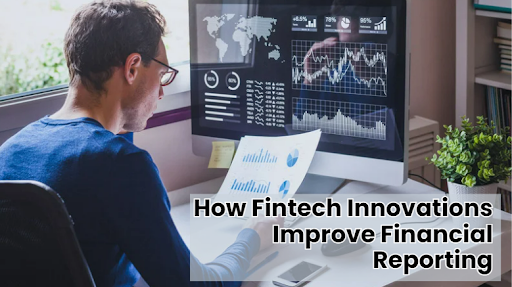How Fintech Innovations Improve Financial Reporting

Are the complexities of financial reporting burdening your business? Would you like an easier way to keep your financial records accurate and up-to-date? With the rapid advancement of technology in the financial sector, the solution to these issues might already be within your reach.
Let’s explore how fintech innovations are transforming financial reporting to become more efficient, accurate, and insightful for businesses of all sizes
Automation and Efficiency
One of the most significant impacts of fintech on financial reporting is the automation of routine tasks. Traditional financial reporting methods involve manual data entry, which is time-consuming and prone to errors.
Fintech solutions, such as SaaS accounting software, enable real-time data entry and reconciliation. This not only saves time but also reduces the risk of human error, ensuring more accurate financial reports.
For small businesses, this means that even those with limited accounting knowledge can effectively manage their books. Automated bookkeeping services handle transactions, categorize expenses, and generate reports with minimal human input.
Real-time Information on Finances
Fintech innovations have been instrumental in making real-time financial data accessible to businesses of all sizes, offering game-changing opportunities for their operations. Traditional methods often rendered financial reports outdated by the time they were compiled and analyzed. Now, with real-time data, businesses can make informed decisions based on the most current financial information.
Real-time data is crucial for experienced CFOs and ecommerce bookkeeping services, aiding in tracking cash flows and expenses while updating financial performance in real-time. This availability of real-time data facilitates proactive financial management and strategy adjustments, allowing modifications to the CFO’s business plan as needed.
Improved Accuracy and Compliance
High accuracy in financial reporting ensures compliance with regulatory standards and fosters stakeholders’ trust. Fintech innovations bring accuracy to the forefront by reducing the scope of manual intervention and integrating advanced algorithms that detect anomalies and inconsistencies.
Accounting and bookkeeping services using FinTech tools ensure adherence to local and international laws. These tools can easily update the tax code, automatically generate compliant financial statements, and provide audit trails in addition to accurate record-keeping.
Better Data Analysis and Insights
Fintech tools offer advanced data analytical capabilities that go beyond traditional financial reporting. These technologies process vast amounts of data and provide insights through visualization, predictive analytics, and trend analysis.
For example, SaaS accounting software generates dashboards that highlight key performance indicators, allowing businesses to identify trends and make data-driven decisions.
These are very valuable insights for any accountant or bookkeeper. With advanced analytics, they can provide more strategic advice to clients in small businesses or large corporations. Modern accounting and bookkeeping services stand out from traditional ones by providing deeper insights.
Smoother Collaboration
Often, collaboration on financial reporting is necessary among different stakeholders, such as accountants, bookkeepers, CFOs, and business owners. Fintech innovations enable this through cloud-based platforms, allowing multiple users to access and work on the same financial data simultaneously.
These platforms support advanced communication and document sharing, making financial reporting tasks easier for teams. For example, a bookkeeper can update financial records in real-time as events occur.
These changes are immediately available to the CFO and other team members. This kind of collaboration makes tasks done more efficiently, ensuring that all are working from the most current information.
Cost-Effective Solutions
Fintech solutions can be more cost-effective than traditional financial reporting methods. Automation reduces the need for extensive manual labor, and cloud-based platforms eliminate on-premises infrastructure expenses. This is particularly true for small businesses and startups with limited budgets for accounting and financial management.
For accountants and startups, this drives the process and reduces overhead costs. It provides a scalable way for fast-growing startups to manage their finances without significant investments in accounting infrastructure.
Tightened Security
Among all aspects, security is the most critical concern in financial reporting, and fintech innovations have made tremendous strides in this area. Modern fintech solutions secure sensitive financial information through advanced encryption methods, secure data storage, and multi-factor authentication.
This added security gives confidence to businesses that outsource their accounting and bookkeeping services. They can be assured that their financial data is protected from unauthorized access. These security measures are crucial for maintaining the integrity of financial reports and safeguarding stakeholder interests.
Integration with Other Business Systems
Fintech solutions can be integrated with other business systems, such as CRM or ERP software. This integration provides an overview of the entire business, linking financial data with other operational data.
For instance, it can integrate financial reporting tools for a startup accounting service with sales and inventory systems. This integration provides an overview of business performance, highlighting areas for improvement and optimizing operations.
Customization and Scalability
There is a high degree of customization in fintech solutions. This means that businesses are at liberty to alter their financial reporting tools as needed. Starting from customized report templates and going through the automated alerts to complete integration with other software, fin-tech tools accommodate diverse business applications.
Another important advantage is scalability. If a company is growing, financial reporting becomes more complicated. Fintech solutions are capable of scaling to accommodate this kind of growth through increased features and capabilities as needed. This is very important, whether dealing with a small startup or a large corporation.
Ensuring Security in Financial Reporting with Fintech
| Security Measure | Description | Benefit |
| Advanced Encryption | Utilizes strong encryption algorithms to protect sensitive financial data. | Safeguards data from unauthorized access. |
| Secure Data Storage | Stores financial information in secure, compliant data centers. | Prevents data breaches and ensures compliance. |
| Authentication Protocols | Implements multi-factor authentication and access controls. | Enhances security by verifying user identities. |
Conclusion
Fintech innovations have transformed financial reporting, offering benefits such as automation, real-time data access, improved accuracy, and enhanced collaboration.
These technological advancements streamline financial processes, empower better decision-making, and ensure compliance with regulatory standards. For accountants, bookkeepers, and CFOs, embracing fintech can be the key to staying competitive and delivering leading-edge financial management services.
FAQs
- How do fintech innovations automate financial reporting?
Fintech tools automate routine tasks like data entry and reconciliation, reducing manual effort and minimizing errors.
- Why is real-time financial data important for businesses?
Real-time data allows businesses to make informed decisions promptly, based on the most current financial information available.
- How do fintech solutions enhance accuracy in financial reporting?
Fintech utilizes advanced algorithms to detect anomalies and ensure precise financial reporting, minimizing the risk of errors.





